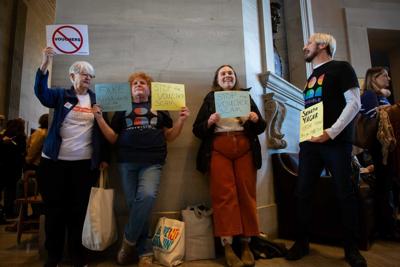This story is a partnership between the Nashville Banner and the Nashville Scene. The Nashville Banner is a nonprofit, nonpartisan news organization focused on civic news. Visit nashvillebanner.com for more information.
A coalition that includes a former Metro Nashville Public Schools administrator and parents of Tennessee public school students filed a lawsuit against Gov. Bill Lee’s universal voucher law on Thursday, arguing that the program violates the Tennessee Constitution. The suit could have wide-ranging implications for a topic that has stirred significant debate throughout the past few legislative sessions and in school hallways across the state.
Controversial legislation costs nearly half of $910 million budget passed for governor’s priorities
Lee signed the voucher bill, a pet project since he took office in 2019, into effect in February. This school year, the Tennessee Department of Education has issued approximately 20,000 vouchers, each worth $7,295, out of nearly 43,000 K-12 applicants. Recipients can use these funds to attend private schools.
“If the program is permitted to stand,” the complaint reads, “it will continue to drain funds from under-resourced public schools and send hundreds of millions in taxpayer dollars to unregulated private schools.”
The lawsuit’s challenge to the program’s constitutionality hinges on the Education Clause in the Tennessee Constitution, which reads as follows:
The state of Tennessee recognizes the inherent value of education and encourages its support. The General Assembly shall provide for the maintenance, support and eligibility standards of a system of free public schools. The General Assembly may establish and support such postsecondary educational institutions, including public institutions of higher learning, as it determines.
The suit also relies on part of a 1993 Tennessee Supreme Court opinion, which reads as follows:
The General Assembly shall maintain and support a system of free public schools that provides, at least, the opportunity to acquire general knowledge, develop the powers of reasoning and judgment, and generally prepare students intellectually for a mature life. … This is an enforceable standard for assessing the educational opportunities provided in the several districts throughout the state.
The plaintiffs argue that the clause refers to a single system of public education and that private schools, by definition, fall outside that system. They also argue that the language in the clause provides for public/private partnerships in higher education, but not at the K-12 level.
“Voucher schools do not adhere to the same academic, accountability, governance, and anti-discrimination requirements as public schools,” the lawsuit reads. “And they are not free.”
More than 38,000 applications submitted for scholarship program
The plaintiffs also point out poor student outcomes and a lack of funding in current public schools before the voucher program, arguing that further defunding public schools has resulted in the state shirking its constitutional burden. The suit says that the gap between public and private schools will widen as school districts experience teacher and staff shortages, decaying facilities, lack of professional development for faculty, poor technology and overcrowding due to lack of funding.
The lawsuit seeks a judgment declaring the voucher program unconstitutional, as well as temporary and permanent injunctions against the program and a jury trial. A three-judge panel will hear the case since it contains a constitutional claim.
Recent Banner reporting
The Nashville Banner has recently reported on the results of the first year of the voucher program, finding a lack of accountability from many voucher-eligible private schools in terms of testing and curriculum, in addition to exclusionary policies against certain students.
Voucher-eligible schools are not required to use the Tennessee Comprehensive Assessment Program (TCAP), the tests that every public school student has to take. The state is under no obligation to collect data on these schools, many of which are religiously affiliated.
State Rep. Gloria Johnson (D-Knoxville) attempted to introduce an amendment to the voucher bill that would hold recipient schools to similar public accountability requirements as public schools, but it was tabled.
“Certainly it concerns me as a teacher,” Johnson said. “But as an elected official, we are accountable for these millions — and it will be a billion in just a few years — dollars that we are sending to private schools that are not held to any standard of transparency or accountability.”
The lawsuit cites a 170-teacher shortage in MNPS, as well as a lack of special education teachers and counselors. The district also experiences a high teacher turnover rate and lacks adequate supplies. About one-third of all MNPS students met grade-level expectations on the TCAP.
“The State already fails to deliver a constitutionally adequate education in far too many cases,” the lawsuit’s conclusion reads.
It remains to be seen if the state can survive a true constitutional challenge to one of Lee’s key pieces of legislation.
This article first appeared on Nashville Banner and is republished here under a Creative Commons Attribution-NoDerivatives 4.0 International License.![]()







